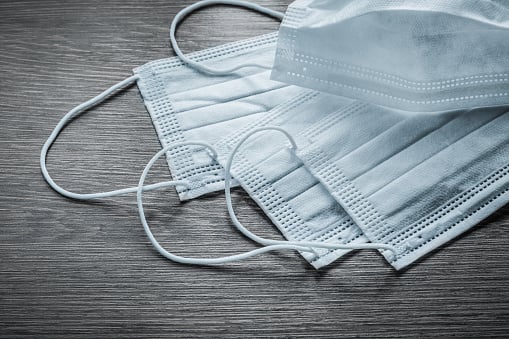Is a Surgical Mask Really Better Than Cloth Masks? The Benefits & Disadvantages of Different Mask Types
Masks are becoming an essential part of life in the midst of the COVID-19 pandemic. People trying to stay safe and protect others are faced with a dilemma when it comes to choosing the right type of mask for their needs. Some people opt for traditional cloth masks, while others swear by surgical masks that offer higher levels of protection. But which one is really better? Let’s take a closer look at the benefits and disadvantages of different mask types and drill down on whether or not surgical masks are really better than cloth masks.
A Review of the Different Kinds of Masks & How They Work
There are several types of masks that are used for different purposes. Here is a review of the most common types of masks and how they work:
Cloth masks: Cloth masks are made from a variety of materials, including cotton, polyester, or a combination of both. They are designed to prevent the spread of respiratory droplets and help reduce the transmission of respiratory viruses, such as COVID-19. Cloth masks come in different sizes, shapes, and designs and can be washed and reused.
N95 masks: N95 masks are filtering respirators that are designed to fit tightly to the face and filter out at least 95% of airborne particles, including bacteria and viruses. N95 masks are commonly used in healthcare settings and are designed to protect against the spread of respiratory viruses.
Surgical masks: Surgical masks are loose-fitting masks that are designed to protect the wearer from the spread of respiratory droplets and to prevent the wearer from contaminating their surroundings. Surgical masks are often used in healthcare settings and are designed to be disposable.
KN95 masks: KN95 masks are similar to N95 masks and are designed to filter out at least 95% of airborne particles. KN95 masks are commonly used in China and are equivalent to N95 masks in terms of filtration efficiency.
Face shields: Face shields are clear plastic shields that cover the entire face and provide additional protection against respiratory droplets. Face shields are often used in healthcare settings and can be worn in combination with a mask to provide added protection.
All of these masks work by blocking respiratory droplets and helping to reduce the spread of respiratory viruses. However, it's important to note that not all masks are created equal, and some masks are more effective at filtering out respiratory droplets than others. It's also important to wear masks correctly and to maintain good hand hygiene to help reduce the spread of respiratory viruses.
What are the Health Benefits of Using a Surgical Mask?
Surgical masks have several health benefits, including:
Protection against respiratory droplets: Surgical masks are designed to prevent the spread of respiratory droplets and reduce the transmission of respiratory viruses, such as COVID-19. By wearing a surgical mask, you can help protect others from potentially infectious respiratory droplets that you might be exhaling.
Reduced risk of infection: Surgical masks can also help reduce your own risk of infection by blocking respiratory droplets that might contain viruses or bacteria.
Barrier against dust and pollution: Surgical masks can also serve as a barrier against dust, pollen, and other air pollutants that can irritate the eyes, nose, and throat.
Improved hygiene: Wearing a surgical mask can also promote good hygiene and help prevent the spread of infections in public places, such as hospitals, schools, and public transportation.
It's important to note that while surgical masks can provide some level of protection against respiratory droplets and other air pollutants, they are not as effective as N95 masks and other respirators. Additionally, surgical masks are not designed to provide a tight seal around the face, which means that they may not be as effective at filtering out airborne particles.
If you are concerned about your health and the health of others, it's important to wear a mask correctly and maintain good hand hygiene. You should also follow guidance from public health authorities and take other precautions, such as practicing social distancing and getting vaccinated, to help reduce the spread of respiratory viruses.
Is a Surgical Mask Better Than a Cloth Mask for Air Pollution Protection?
The efficacy of a surgical mask compared to a cloth mask for air pollution protection depends on several factors, including the type of air pollution and the fit of the mask.
Surgical masks are designed to filter out respiratory droplets and can provide some protection against air pollution, including fine particulate matter. However, surgical masks are not designed specifically for air pollution protection and may not provide adequate protection against fine particulate matter, especially if the fit is not tight.
Cloth masks, on the other hand, can provide some protection against air pollution, including fine particulate matter, depending on the type of material used and the number of layers. Some cloth masks are designed specifically for air pollution protection and can be more effective than surgical masks in filtering out fine particulate matter.
In general, N95 masks and other respirators are considered to be the most effective for air pollution protection, as they are designed to filter out at least 95% of airborne particles, including fine particulate matter. However, these masks can be more difficult to obtain and are typically reserved for healthcare workers and other essential workers.
It's important to note that wearing any mask, whether it's a surgical mask or a cloth mask, is better than not wearing a mask at all. If you are concerned about air pollution, you may also want to consider other measures, such as staying indoors during periods of high air pollution, using air purifiers, and avoiding outdoor activities during heavy traffic.
The Pros & Cons of Using a Surgical or Cloth Mask for COVID-19 Prevention
Pros of using a surgical mask for COVID-19 prevention:
Protection against respiratory droplets: Surgical masks are designed to prevent the spread of respiratory droplets and reduce the transmission of respiratory viruses, such as COVID-19. By wearing a surgical mask, you can help protect others from potentially infectious respiratory droplets that you might be exhaling.
Reduced risk of infection: Surgical masks can also help reduce your own risk of infection by blocking respiratory droplets that might contain viruses or bacteria.
Barrier against dust and other airborne particles: Surgical masks can also serve as a barrier against dust, pollen, and other air pollutants that can irritate the eyes, nose, and throat.
Cons of using a surgical mask for COVID-19 prevention:
Limited protection: Surgical masks are not designed to provide a tight seal around the face, which means that they may not be as effective at filtering out airborne particles, including COVID-19.
Lack of durability: Surgical masks are designed for single use and should be disposed of after each use. This can lead to a higher cost over time and an increased demand for surgical masks, which can be difficult to meet during a pandemic.
Pros of using a cloth mask for COVID-19 prevention:
Reusable: Cloth masks can be reused multiple times, which can help reduce the demand for disposable masks and the amount of waste generated.
Customizable: Cloth masks come in a variety of colors, patterns, and designs, allowing you to choose a mask that fits your personal style.
Affordable: Cloth masks are often less expensive than surgical masks, making them a more accessible option for people who need to wear masks frequently.
Cons of using a cloth mask for COVID-19 prevention:
Variability in protection: The effectiveness of a cloth mask in protecting against COVID-19 can vary depending on the type of material used and the number of layers.
Proper washing and maintenance: Cloth masks should be washed after each use and may need to be replaced more frequently than surgical masks, which can be time-consuming and inconvenient.
In conclusion, both surgical masks and cloth masks have their pros and cons when it comes to COVID-19 prevention. It's important to choose a mask that fits properly, covers your nose and mouth, and is made from a breathable material. Regardless of which type of mask you choose, it's important to follow other preventive measures, such as practicing good hand hygiene, avoiding close contact with others, and getting vaccinated.

